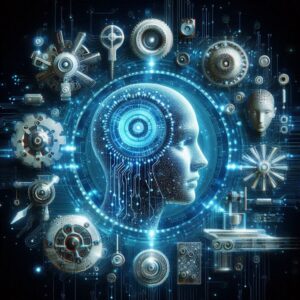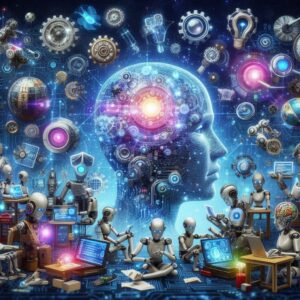Table of contents:
Artificial intelligence might seem like a present-day innovation, but it is not. Its early beginnings date back to the 1900s. Early experts pioneered AI’s integration into our daily lives and made the most significant strides in its development.
Knowing and understanding AI’s history and evolution helps us understand where AI is now and potential future advancements. AI’s journey is intriguing and transformative, from its early groundwork to recent breakthroughs.
The Initial Development of Artificial Intelligence
Walking through time will help you understand that the roots of AI lie in ancient history. It all begins with ancient stories and myths about artificial beings endowed with intelligence. However, the concept of AI development took off in the 20th century.
Alan Turing, a highly influential figure in the birth of AI, proposed what is known as ‘the Turing test’, a way to measure a machine’s ability to simulate any human intelligence. This test practically involves a human evaluator’s ability to distinguish between a human and a machine.
The Dartmouth Conference of 1956 is considered the birthplace of AI. It was officially named there and started as a research field. It was organized by John McCarthy, Marvin Minsky, Nathaniel Rochester, and Claude Shannon, some of the greatest thinkers in AI. They hypothesized that “every aspect of learning or any other feature of intelligence can in principle be so precisely described that a machine can be made to simulate it.”
During these early years, researchers developed the first AI programs. These programs could perform tasks such as solving algebra problems and proving theorems. The Logic Theorist, written by Allen Newell and Herbert A. Simon in 1955, was one of the pioneering AI programs. It was seen as a breakthrough in AI as it could prove mathematical research. It marked significant advancements in symbolic AI with its ability to automate reasoning.
Early Programs and Research
The 1960s and 1970s were pivotal decades for AI development. This period marked notable advancements in understanding and simulating human cognitive processes. Researchers focused on developing algorithms that could mimic human reasoning and problem-solving skills.
A notable example was ELIZA, a natural language processing computer program created by Joseph Weizenbaum in 1966. ELIZA simulated a conversation with a Rogerian psychotherapist by matching their input to pre-defined responses and scripts. Although Eliza’s understanding had limits, it showcased machines’ capability to understand and generate human language.
AI researchers began exploring the concepts of AI and machine learning. A process where computers could learn from data rather than programming. Arthur Samuel’s work on checkers-playing programs improved machine performance over time. Heuristic search methods also boosted problem-solving efficiency. These early programs laid the foundation for modern machine-learning techniques used today.
Challenges and Criticism
The early years of AI research were filled with excitement and pessimism. Researchers have made significant advancements in understanding AI’s strengths and weaknesses. The LISP programming language provided a tool for creating more sophisticated AI systems. Minsky’s work on neural networks and symbolic reasoning also laid the foundation for future AI advancements. However, progress was not without its challenges.
After the progress of the 1950s and 1960s, the 1970s and 1980s saw periods of “AI winters,” a period when interest in AI research slowed down. Unrealistic expectations and the realization of the immense complexity of achieving progress were the two driving forces. Using symbolic reasoning meant that real-world problems were too complex to handle at the time. Technical limitations were also factors that slowed AI development.
There were two major setbacks that caused a slowdown in progress and innovation:
- Sir James Lighthill criticized the industry, highlighting its limitations and concluding that AI research can’t deliver results.
- Lack of funding from the Defense Advanced Research Projects Agency (DARPA) by the mid-1970s.
Despite these setbacks from roughly 1974 to 1980, some notable advancements were made.
- Researchers reevaluated their priorities, considering their budget.
- There was an apparent change from pursuing frivolities to creating more practical and sophisticated AI applications.
- The development of expert systems focused on solving specific, manageable problems.
These systems used rule-based programming to emulate human decision-making for problems in medicine, engineering, and finance.
The Evolution of Artificial Intelligence Today
Artificial intelligence has come a long way since its inception. AI has been propelled into an era of advancements in computational power, data availability, and innovation. We’ve seen recent developments in easy-to-use AI tools like virtual assistants, search engines, etc.
During this period, they also popularized Deep Learning and Big Data. Machine learning led to progress in applications like NLP, recommendation systems, and autonomous vehicles. Computers now recognize patterns and make decisions based on vast amounts of data.
Today, AI technology is integrated into homes and industries. Intelligent virtual and voice assistants like Siri and Alexa manage and streamline tasks. AI software development also provides recommendation systems on platforms like Netflix and Amazon.
This tailors services to user preferences and ensures user satisfaction. AI in software development has also benefited from this transformation. New AI-powered tools aid in generating code, optimizing tags, and eliminating threats.
AI is making groundbreaking impacts in various industries, such as healthcare, finance, and marketing. AI algorithms analyze medical data, predict diagnoses, and recommend patient treatment plans. They also help detect cyber crimes and handle trading in finance.
Additionally, marketing professionals now provide better-optimized services that ensure ultimate user satisfaction. You can use AI today to enhance convenience, improve efficiency, or further innovation. AI technology generally transforms our daily experiences.
What Does the Future Hold for Artificial Intelligence?
From here on, the question on your mind will be, What’s next for AI? The future of AI holds immense potential and exciting possibilities.
Continuous advancements and research will lead to more sophisticated AI systems. AGI is a research study in which machines possess human abilities to learn, understand, and apply knowledge. Integrating emerging technologies like blockchain, quantum computing, and IoT will broaden its scope.
However, the impact of AI on various sectors needs to be carefully examined. Ethical and societal factors must be considered to ensure the smooth, transparent, and accountable functioning of AI systems.
Ethical and Societal Considerations
- AI in Software Development: Maintaining privacy standards and protecting user data is crucial.
- Job Displacement: AI’s potentially transitioning workforce and displacing humans should be addressed.
- Accountability: Creating rules and procedures for AI in decision-making to ensure accountability
- Autonomous Weapons: Prevention of Misuse of AI-Powered Weapons in Military Applications
How North South Tech Can Help You Navigate the Evolving World of AI
North South Tech is at the forefront of AI innovation, and we can help you harness its potential to benefit your business. Here’s how:
- AI Strategy and Consulting: Our experts can help you develop a comprehensive AI strategy aligned with your business goals. We’ll assess your needs and recommend the best AI solutions to streamline operations, improve efficiency, and gain a competitive edge.
- AI Implementation and Development: We have a team of skilled engineers who can design and implement custom AI solutions tailored to your specific needs. Whether you need AI-powered chatbots, recommendation systems, or data analysis tools, we can build it for you.
- Integration and Support: We ensure a smooth integration of AI solutions into your existing infrastructure and provide ongoing support to maximize your return on investment.
Ready to leverage the power of AI for your business? Contact North South Tech today for a free consultation!



